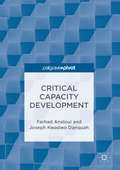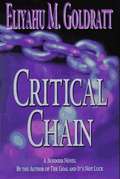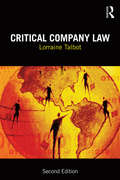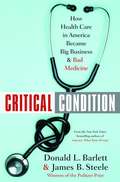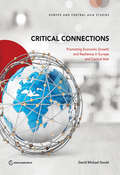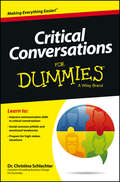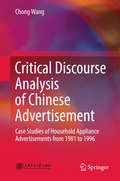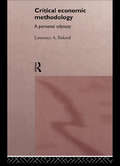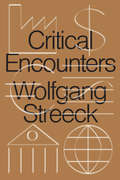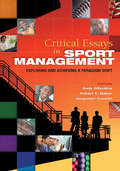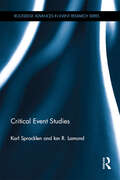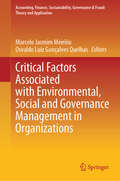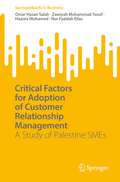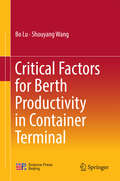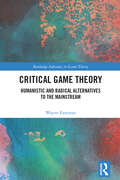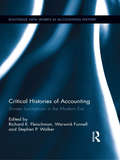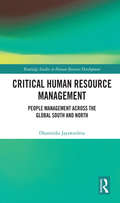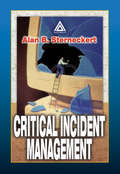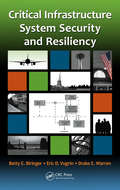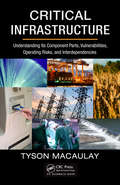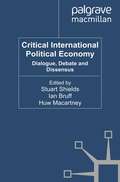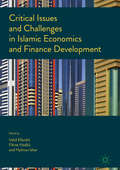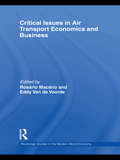- Table View
- List View
Critical Capacity Development
by Farhad Analoui Joseph Kwadwo DanquahThis book contributes to our understanding of a neglected and poorly-understood concept within the development field: 'capacity development' in the context of human and organisational sustainable development. Relating 'capacity development' to other perspectives in development thinking and practice and giving an account of the concept's genesis, the book introduces readers to recent empirical research initiatives that help to elucidate the concepts of capacity, capacity development, and capacity management. While capacity development initiatives and programmes have been used by most international and national agencies over the course of the last five decades, the term means different things to different people and especially to different major players in the international community. This weakens its effectiveness. This book therefore strives first of all to set ground rules that can be utilised by international aid providers such as UNDP, OECD, World Bank, and CIDA and practitioners alike.
Critical Chain
by Eliyahu M. GoldrattA business novel focusing on project management. The novel aims to provoke readers to examine and reassess their business practices and transform the thinking and actions of managers.
Critical Company Law
by Lorraine TalbotThe second edition of Critical Company Law provides a framework in which to understand how the company functions in society and a thorough grounding in modern legal doctrine. It shows how modern company law is shaped by a multi-layered history of politics, ideology, economics and power. Through the lens of political economic theory the book shows how the company becomes the mechanism through which the state makes political choices about distributing societies’ wealth and through which it responds to economic crises. The current law reflects an economy marked by a disjuncture between the low profits of the productive economy and the high profits of the finance economy. Critical Company Law examines areas of company law to show how they reflect a fragile economy inexorably drawn to social and economic inequality and short-termism. These include: • The Doctrine of Separate Corporate Personality • Groups of Companies and Tort Liabilities • Company Formation and the Constitution • Directors’ Duties and Authority • Corporate Capacity • Shares and Shareholders • Raising and Maintaining Capital • Minority Protection In this uniquely hybrid book the legal topics are treated with detail and clarity, providing an engaging introduction to the key topics required for a student of company law.
Critical Condition
by Donald L. Barlett James B. SteeleExposing the most controversial, little-known practices of America’s most flawed system, Time magazine’s Pulitzer Prize-winning investigative team pulls back the curtain on the health care industry to explain exactly how things grew so out of control. Dirty examination and operating rooms in doctor’s offices and hospitals . . . Health care executives pulling in millions in bonuses for denying treatment to the sick . . . More than 100 million people with inadequate or no medical coverage . . . This may sound like the predicament of a third-world nation, but this is America’s health care reality today. The U. S. spends more on health care than any other nation, yet our benefits are shrinking and life expectancy is shorter here than in countries that spend significantly less per capita. Meanwhile, HMOs, pharmaceutical companies, and hospital chains reap tremendous profits, while politicians—beholden to insurers and drug companies—enact legislation for the benefit of the few rather than the many, while the entire system is on the verge of collapse. In CRITICAL CONDITION, award-winning investigative journalists Donald L. Barlett and James B. Steele expose the horror of what health care in America has become. They profile patients and doctors trapped by the system and offer startling personal stories that illuminate what’s gone wrong. Doctors tell of being second-guessed and undermined by health care insurers; nurses recount chilling tales of hospital meltdowns; patients explain how they’ve been victimized by a system that is meant to care for them. Drug companies profit by selling pills in the same manner that Madison Avenue sells soap, while Wall Street rakes in billions by building up and then tearing down health care businesses. And politicians pass legislation perpetuating the injustices and out-right fraud the system encourages. By analyzing the industry and offering an insightful prescription for getting it back on the right track, CRITICAL CONDITION is an enormously compelling investigative work that addresses the concerns of every American.
Critical Connections: Promoting Economic Growth and Resilience in Europe and Central Asia (Europe and Central Asia Studies)
by David Michael GouldCritical Connections examines how trade, investment, migration, and other linkages among countries drive economic growth in the Europe and Central Asia region. The study breaks new ground by using a multidimensional approach that recognizes how each connectivity channel for growth is likely to be affected by the strength of other channels. This multidimensional view makes it easier to see that diversity in country connections and balance in all channels of connectivity are critical for achieving the greatest impact on growth. Europe and Central Asia provides a great laboratory for observing the role of multidimensional connectivity in action. The region’s 30 countries vary widely in the openness of their economies. Its collective experience shows how the various elements of cross-border connectivity work together to accelerate progrowth knowledge transfers, which in turn boost productivity through participation in today’s global value chains. A country’s economic partner might be just as important as the type of connection. Being well connected to highly connected countries can provide benefits beyond being well connected to comparatively isolated countries. Although greater connectivity can expose countries to external shocks, the report presents fact-based argument for policies that seek to build deeper and more diverse connections within the Europe and Central Asia region and globally. The message is timely. Europe’s once-confident march toward economic integration has slowed over the past decade, with voices in many countries questioning the wisdom of opening to the global economy. Critical Connections serves as a reminder to citizens and policy makers that greater regional and global connectivity has been a tremendous “convergence machine,†? raising living standards of lower-income countries toward those of wealthier middle- to high-income countries.
Critical Conversations For Dummies
by Christina Tangora SchlachterThe easy way to communicate best when it matters mostMost people are aware of the importance of handling critical conversations well. However, when it comes down to actually being in a difficult situation that calls for key communication skills, many do not know how to practically apply their own thoughts.Critical Conversations For Dummies is a step-by-step reference for the variety of crucial conversations life presents in the workforce. It's packed with strategies for preparing for high-stakes situations; being persuasive (not abrasive); knowing the value of assertive communication; resolving failed promises and missed deadlines; maintaining morale when firing staff; getting new employees off on the right foot; managing staff relations and strengthening team relationships; understanding audience needs and motivations to get positive results; altering confrontational language to cooperative language during difficult conversations; and building relationships in the face of conflict.Improve communication skills in crucial conversationsAvoid common pitfalls and emotional tendenciesDiscover the benefits of success in crucial conversations This book is especially relevant to the hundreds of thousands of leaders who are tasked with multiple duties, whether addressing complex problems from stakeholders or achieving exceptional results from staff.
Critical Debates in Tourism
by Tej Vir SinghIn this volume tourism experts collectively discuss and debate some intriguing questions that the tourism industry poses, such as the relevance of mass tourism, the dilemma of authenticity, whether small tourism is beautiful, whether volunteer tourism is benign, whether tourism contributes to climate change, as well as many others. The book brings together the expertise of 35 renowned international scholars of tourism to examine these perplexing issues. Multidisciplinary in its content, it touches upon anthropology, sociology, geography, climatology, biosciences, and planning and development aspects of tourism. The book provides a dialogue for an academic discussion which challenges research conservatism and stereotypes in tourism studies. It will encourage scholars to test the consistency of critical notions whose heuristic value is often taken for granted. The book will benefit graduates, research scholars and those involved in organizing the industry sustainably.
Critical Discourse Analysis of Chinese Advertisement: Case Studies of Household Appliance Advertisements from 1981 to 1996
by Chong WangThis book reflects the chronological changes in Chinese cultural values, social relations, economy and politics by critically analyzing the Chinese advertising discourse. The work is based on research into the ideological values portrayed in Chinese household appliance advertisements in the 1980s - 1990s. The analytical framework covers a variety of methods: critical discourse analysis, chronological analysis, visual and verbal analysis, and qualitative and quantitative analysis. The findings suggest that ideological values consciously or unconsciously manifested by the visual and verbal devices in the Chinese advertisements moved in a pattern from simplicity to diversity, from being politically-oriented to being economically and profit-oriented, from conservatism to globalization and westernization, in keeping with the progression of the Chinese economic reform. The findings further indicate that the ideological values in the Chinese household appliance advertisements are embedded in the advertising language and illustrations. Lastly, the work reveals the reality of Chinese politics, economy and society at a time when China experienced the growth of the market economy and evolution of Chinese mainstream ideologies, and demonstrates the impacts of these changes on the ideological meanings in advertisements. This book will help readers discover the more profound meanings behind the superficial content of Chinese advertisements.
Critical Economic Methodology: A Personal Odyssey
by Lawrence BolandLawrence Boland takes issue with both economic methodologists and practicing economists. He argues that there has been too much 'methodology for methodology's sake' and that mainstream economics might benefit by using methodology to take a critical look at economic theory.
Critical Encounters: Capitalism, Democracy, Ideas
by Wolfgang StreeckAn anthology of long-read book reviews by one of the European left&’s foremost political economistsFrom the acclaimed author of How Will Capitalism End? comes an omnibus of long-form critical essays engaging with leading economists and thinkers. Critical Encounters draws on Wolfgang Streeck&’s inimitable writing for the London Review of Books and New Left Review, among other publications. It opens with treatments of two contrasting historical eras—factory capitalism and financialization—and three of the world&’s major economies: the United States, France and Germany. A middle section surveys the hollowing out of Western democracies and reviews Yanis Varoufakis&’s &“strange but indispensable&” memoir of the eurozone crisis. Delving into the world of ideas, Streeck discusses the work of Quinn Slobodian, Mark Blyth, Jürgen Habermas and Perry Anderson. Finally, he zooms out to compare his home discipline of sociology to natural history, giving a remarkable and non-deterministic reading of Charles Darwin. In the preface, Streeck reflects on the art (or craft) of book reviewing and the continuing merits of the book form. Critical Encounters also includes a series of &“Letters from Europe,&” penned as the coronavirus descended upon the Continent.
Critical Essays in Sport Management: Exploring and Achieving a Paradigm Shift
by Andy Gillentine Robert Baker Jacquelyn CuneenThis collection of essays, written by a number of respected sport management scholars, addresses many of the challenges and issues facing today's sport management academic programs. It is intended to begin a professional and scholarly discussion to identify the best, or at least the most logical, paths to follow for sport management programs and the industry with which they are so closely aligned. Contributors, invited to participate based on their recognized areas of expertise, address specific topics using their own unique voices and writing styles. In the ebook version, essays link to video introductions by the authors and to online discussion forums where readers can respond to the issues presented in the essays. From the Preface: The field of sport management stands at an academic crossroads; the essays in this book address the following and other emerging questions: Should our successful field of study continue to model other disciplines and perpetuate their successes, as well as their shortcomings, or should we determine our own specific model for academic success? How are we doing in preparing future sport managers to perform in the industry and on the global stage? Where do we belong in the scheme of academe? The book's goal is to generate discussion among sport management professors, industry professionals who serve as adjunct faculty and participate on sport management program advisory boards, doctoral students who intend to teach in sport management programs, and others who explore and critique higher education in general.
Critical Event Studies: Approaches To Research (Routledge Advances in Event Research Series)
by Karl Spracklen Ian R. LamondWithin events management, events are commonly categorised within two axes, size and content. Along the size axis events range between the small scale and local, through major events, which garner greater media interest, to internationally significant hallmark and mega events such as the Edinburgh Festival and the Tour de France. Content is frequently divided into three forms – culture, sport or business. However, such frameworks overlook and depoliticise a significant variety of events, those more accurately construed as protest.This book brings together new research and theories from around the world and across sociology, leisure studies, politics and cultural studies to develop a new critical pedagogy and critical theory of events. It is the first research monograph that deals explicitly with the concept of critical event studies (CES), the idea that it is impossible to explore and understand events without understanding the wider social, cultural and political contexts. It addresses questions such as can the occupation and reclamation of specific spaces by activists be understood as events within its framework? And is the activity of activists in these spaces a leisure activity? If those, and other similar activities, can be read as events and leisure, what does admitting them into the scope of events management and leisure studies mean for our understanding of them and how the study of events management is to be conceptualised? This title will be of interest to undergraduate and postgraduate students on events management and related courses and scholars interested in understanding the ways in which events are constructed by the social, the cultural and the political.
Critical Factors Associated with Environmental, Social and Governance Management in Organizations (Accounting, Finance, Sustainability, Governance & Fraud: Theory and Application)
by Marcelo Jasmim Meiriño Osvaldo Luiz Gonçalves QuelhasThis book offers a comprehensive exploration of Environmental, Social, and Governance (ESG) principles, showing how they can be harnessed to enhance organizational sustainability. In an era where ESG is gaining increasing recognition for its transformative potential, this work delves into the practical aspects of leveraging ESG to improve governance, bolster corporate image, build credibility, and foster reputation. It also unveils the exciting realm of new business opportunities, particularly in the domains of social and environmental responsibility. What sets this book apart is its hands-on approach. Each chapter unfolds with compelling real-life case studies that draw readers into the dynamic world of ESG. As you progress through the pages, readers encounter thought-provoking questions and challenging case scenarios, inviting you to not just passively absorb information, but actively engage with the material. The readers are prompted to reflect on these cases, formulate questions, and even tackle proposed solutions, making readers’ learning experience highly interactive and deeply insightful. The main benefit readers will derive from this work is a panoramic understanding of ESG—from its theoretical underpinnings to its practical implementation. Beyond just providing knowledge, this book equips the reader with a toolkit of ESG management strategies that can be implemented in their own organizations.
Critical Factors for Adoption of Customer Relationship Management: A Study of Palestine SMEs (SpringerBriefs in Business)
by Nur Fazidah Elias Hazura Mohamed Omar Hasan Salah Zawiyah Mohammad YusofThis book explores the challenges in adopting customer relationship management (CRM) models in developing countries, with a focus on Palestine. Examining the cultural, organizational, and technological contexts, it reveals how these factors create adoption gaps, impacting customer pressure, employee engagement, and security. The narrative, enriched by real-world examples from Palestine, underscores the unique hurdles faced by firms in such environments. Emphasizing the central role of customers in business, the book delves into the initiatives many firms take to enhance customer services, target profitable segments, and improve acquisition and retention. However, in developing nations, these efforts encounter distinctive challenges. The book offers a practical CRM model tailored to the specific needs of small and medium-sized enterprises (SMEs), illustrating how technology can elevate competitiveness. With a strategic perspective, it positions CRM as a catalyst for SMEs to navigate the complexities of the dynamic economy, providing actionable insights for professionals, scholars, and business management students. This comprehensive guide encapsulates the nuances of CRM adoption, making it an invaluable resource for those seeking sustainable growth in developing country contexts.
Critical Factors for Berth Productivity in Container Terminal
by Shouyang Wang Bo LuThis book is a comparative study of the critical factors in berth productivity in Chinese and South Korean container terminals. It first defines the concept of berth productivity, and then establishes a regression model to evaluate the productivity factor. With the results obtained for the leading Asian container terminals it identifies the relationship between critical factors for berth productivity and their order of importance. The findings provide guidelines for terminal operators to improve berth productivity.
Critical Game Theory: Humanistic and Radical Alternatives to the Mainstream
by Wayne EastmanThe models in mainstream game theory generally assume that actors act according to a single, consistent utility function. Empirical studies, common sense, and humanistic wisdom all suggest that that assumption is too simple. This book starts with an assumption that actors are controlled by diverse, inconsistent forces and demonstrates that introducing this level of complexity allows for the creation of a wide array of critical game theory models that can help to attain new insights into nature, human nature, human institutions, and human behaviour. Along with a review of existing critical game theory, the book will focus on surfacing and explaining an array of potential critical game theory approaches (including Leftist/Neo-Marxist, Empirical, Entropic, Four Temperaments, and Neurodivergence). As a rule, these models will not be mathematically tractable—but the more complex accounts of interactions that they suggest will often be truer to life, more resonant in humanistic terms, and more compelling as bases for action and for change than mainstream models are. For each chapter, the first part will present a story or case, followed by discussions and explanations couched in nontechnical terms, without the use of matrices. In the third part of each chapter, matrices along with game trees and programs will be used before the last part summarizes the findings. The vision of critical game theory advanced in the book will be of significant interest to researchers in an array of theoretical and applied disciplines, including but not limited to literature, psychology, political science, economics, computer science, ethics, business ethics, law, and law and economics.
Critical Game Theory: Humanistic and Radical Alternatives to the Mainstream (Routledge Advances in Game Theory)
by Wayne EastmanThe models in mainstream game theory generally assume that actors act according to a single, consistent utility function. Empirical studies, common sense, and humanistic wisdom all suggest that that assumption is too simple. This book starts with an assumption that actors are controlled by diverse, inconsistent forces and demonstrates that introducing this level of complexity allows for the creation of critical game theory models that can help to attain new insights into nature, human nature, human institutions, and human behavior.The book begins with an evolutionary, or Evo, model in which the players have concerns for the other player as well as egoistic interests. Part I analyzes the Prisoner’s Dilemma using a literary, or Lit, model in which the players have entropic, or Entro, masochistic and sadistic drives as well as altruistic and egoistic ones. Part II suggests that the Lit model opens the door to a “where Entro is, let Evo be” critical perspective on politics. Part III considers how core stories in mainstream game theory can be usefully supplemented and deepened by critical models and reflects on possible futures for critical game theory. The discussion of games and subgames includes poems as well as matrices, in pursuit of a mode of presentation that respects the complex, simultaneously humanistic and scientific qualities of critical game theory.The vision of critical game theory advanced in the book will be of significant interest to researchers in an array of theoretical and applied disciplines, including but not limited to literature, psychology, political science, economics, computer science, ethics, business ethics, law, and law and economics.
Critical Histories of Accounting: Sinister Inscriptions in the Modern Era (Routledge New Works in Accounting History)
by Warwick Funnell Richard K. Fleischman Stephen P. WalkerThe critical tradition in accounting historiography has come to occupy a prominent place in the discipline’s academic scholarship. Some critical literature has confronted the responsibility of accounting and accountants in precipitating contemporary crises, such as the audit failures that spawned Sarbanes-Oxley and the world-wide recession. Certain contemporary issues have long histories, such as the difficulties encountered by women to break the glass ceiling in public accounting, and the suffering of indigenous peoples under the imperialistic yoke. Other episodes in accounting’s long history are seemingly more divorced from the present, but in reality they all have contemporary significance. Slavery in the New World, for example, although abolished more than a century ago, is still rampant in parts of the world, albeit less formally. Critical accounting historians feel it a duty to harken to the "suppressed voices" of the past, those groups of people who had no access to an accounting record – women, persons of color, indigenous populations, alienated proletarians, victims of governmental incompetence and graft, and many voiceless others. Critical Histories of Accounting: Sinister Inscriptions in the Modern Era draws on the foremost work in this developing literature, both that authored by the co-editors of this volume, and that written by others. Editors Richard K. Fleischman, Warwick N. Funnell, and Steve Walker have written extensively about "the dark side of accounting," gauging the complicity of those performing accounting functions in episodes in human history that are at worst evil and at best reprehensible. The editors have also hand-selected a series of historical and contemporary episodes that have been critically investigated by the wider accounting history community, preceded by a thorough introduction.
Critical Human Resource Management: People Management Across the Global South and North (Routledge Studies in Human Resource Development)
by Dhammika JayawardenaHuman resource management (HRM) is the predominant apparatus for people management across the world. Since its inception, HRM has nevertheless been subjected to critical scrutiny. This work has produced a corpus of literature now referred to as ‘Critical HRM’. This book on Critical HRM traces the development of the critical scholarly tradition in people management. It analyzes, organizes and synthesizes the various perspectives, ideas and arguments that constitute this critical tradition. The book identifies the current status and future trends of Critical HRM, and explores its ethico-political role in contemporary organizations, especially in the context of widespread public concern about making business more ethical. Incorporating under-researched and emerging issues of people management, such as the Global South and Critical HRM, with more established themes of Critical HRM, this book introduces Critical HRM’s critique of mainstream HRM and its underpinning assumptions. It illustrates how interventions have the potential to transform organizational policies and practices of managing people at work. The book will be of interest to professionals, researchers, and academics focusing on critical issues in people management across the Global South and North.
Critical Incident Management
by Alan B. SterneckertMost businesses are aware of the danger posed by malicious network intruders and other internal and external security threats. Unfortunately, in many cases the actions they have taken to secure people, information and infrastructure from outside attacks are inefficient or incomplete. Responding to security threats and incidents requires a competent
Critical Infrastructure System Security and Resiliency
by Drake Warren Betty Biringer Eric VugrinSecurity protections for critical infrastructure nodes are intended to minimize the risks resulting from an initiating event, whether it is an intentional malevolent act or a natural hazard. With an emphasis on protecting an infrastructure's ability to perform its mission or function, Critical Infrastructure System Security and Resiliency presents
Critical Infrastructure: Understanding Its Component Parts, Vulnerabilities, Operating Risks, and Interdependencies
by Tyson MacaulayCritical Infrastructure (CI) is fundamental to the functioning of a modern economy, and consequently, maintaining CI security is paramount. However, despite all the security technology available for threats and risks to CI, this crucial area often generates more fear than rational discussion. Apprehension unfortunately prompts many involved in CI p
Critical International Political Economy
by Stuart Shields Ian Bruff Huw MacartneyAmidst the continued debate surrounding the foundations of IPE, coupled with recent methodological and theoretical divides this book argues that an attempt should be made to re-visit the notion of the 'critical'. The challenge posed by contributors to this volume is to assess the development of so-called critical IPE and interrogate whether the theoretical foundations it was built upon have reached their potential. The essays in this volume take up this challenge in a number of different ways but all share a common concern - to re-assess the purpose of critical approaches, reflect on why certain social theorists have been favoured as a point of departure, yet others have largely been ignored. In light of recent debates on the notion of a 'trans-Atlantic divide' within IPE the collection the contributors aim demonstrates how the distinction between the 'critical' and the 'orthodox' (or 'empirical') is only significant if the 'critical' is geared towards a larger, more substantial body of critical social enquiry and engages with what it means to conduct such enquiry.
Critical Issues and Challenges in Islamic Economics and Finance Development
by Velid Efendić Fikret Hadžić Hylmun IzharThis book explores contemporary issues and trends facing Islamic banks, businesses and economies as presented at the International Conference of Islamic Economics, Banking and Finance. The authors leverage current empirical research and statistics to provide unique and fresh perspectives on the changing world of Islamic finance. They focus specifically on to the implementation of Islamic financial instruments and services in global capital markets and how their success can be evaluated. Chapters feature case studies from all over the world including examples from Afghanistan, Bosnia and Herzegovina and the United Kingdom, to name a few. The breadth and immediacy of the research presented by the authors will appeal to practitioners and scholars alike. The global outlook and rich data-based approach adopted in this book guarantee that it is a timely and valuable addition to the field of Islamic finance.
Critical Issues in Air Transport Economics and Business
by Rosário MacárioThis book offers material for strategic thinking featuring contributions from key figures in Europe, the US and Asia. The focus of the book expands from economic to legal issues, bankruptcy and safety and security. The carefully selected papers offer a thorough and structured analysis of major current developments in the air transport industry. Fully up to date, topics covered include competitive strength, capacity utilisation and risk. The most likely future scenarios are more or less known. Only, the timeframe remains uncertain. The speed at which the various market players in the air transport chain will implement their strategies remains the key question. This depends on a whole range of exogenous and endogenous variables, as this book aspires to demonstrate. As both an overview of the current issues affecting the industry and as a cohesive set of strategic documents, therefore, this collection will prove invaluable for policy makers and researchers alike.
